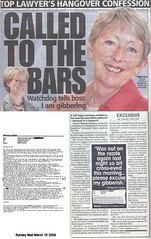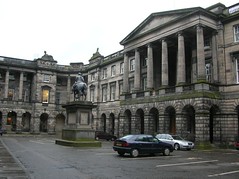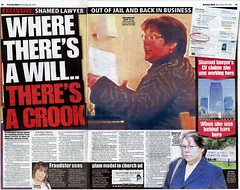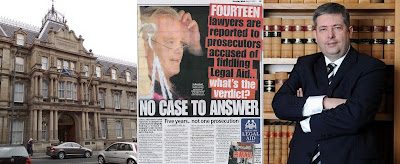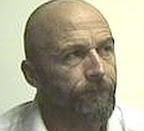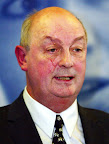 Lord President Lord Hamilton was critical of failures at the Scottish Legal Complaints Commission in appeal judgement for lawyer. THE COURT OF SESSION has allowed an appeal by a partner in the law firm of Biggart Ballie LLP against a decision of the Scottish Legal Complaints Commission (SLCC) to dismiss his complaint against his own firm as "vexatious and totally without merit". The judgement, handed down by the Lord President Lord Hamilton, Lord Bonomy & Lord Marnoch was critical of the SLCC’s decision to dismiss the complaint, relying on the fact David Hamilton Kidd, the solicitor who made the complaint was still a partner at Biggart Ballie. The blundering anti-client SLCC was also heavily criticised by the judges for failing to take steps “to identify with exactness against which solicitor or solicitors this complaint was truly directed”. The critical judgement ironically came on the same day Justice Secretary Kenny MacAskill made yet more appointments to the SLCC’s notoriously anti-consumer board.
Lord President Lord Hamilton was critical of failures at the Scottish Legal Complaints Commission in appeal judgement for lawyer. THE COURT OF SESSION has allowed an appeal by a partner in the law firm of Biggart Ballie LLP against a decision of the Scottish Legal Complaints Commission (SLCC) to dismiss his complaint against his own firm as "vexatious and totally without merit". The judgement, handed down by the Lord President Lord Hamilton, Lord Bonomy & Lord Marnoch was critical of the SLCC’s decision to dismiss the complaint, relying on the fact David Hamilton Kidd, the solicitor who made the complaint was still a partner at Biggart Ballie. The blundering anti-client SLCC was also heavily criticised by the judges for failing to take steps “to identify with exactness against which solicitor or solicitors this complaint was truly directed”. The critical judgement ironically came on the same day Justice Secretary Kenny MacAskill made yet more appointments to the SLCC’s notoriously anti-consumer board.
While the Court of Session’s judgement scrapped the SLCC’s decision not to investigate the complaint filed by the solicitor, David Hamilton Kidd, and remitted it back to the SLCC to be dealt with, it is noted the solicitor who won the latest round in the numerous court challenges brought by solicitors against the SLCC has himself, faced controversy before, having an entry on the well known Scottish legal scandal expose website BentJudges.com, where during the course of the same law firm Biggart Baillie acting for a clients, letters appear to have been doctored so information was withheld from their client who then complained to the Law Society of Scotland. The Bentjudges.com website goes onto further report Mr Kidd “lost the client's file which contained documentary evidence incriminating his Biggart Baillie colleague, Alan McFarlane in a scheme to defraud a client”.
BentJudges.com reports : “In 2002/2003 the Scottish Legal Services Ombudsman (SLSO) found that the Law Society had twice failed to "understand or investigate" allegations of collusion and conflict of interest against the then law society president’s firm, Biggart Baillie LLP, and two partners. The SLSO findings on the Law Society’s investigation and re-investigation substantiates this website's contention that the Law Society’s failure in its statutory duty to investigate complaints is, without doubt, premeditated. The failures in question involved such extreme departures from established legal principles – coupled with a total disregard of clear-cut evidence of professional misconduct. Any possibility that those failures can be attributed to investigative negligence on the part of those distinguished Law Society legal minds, must surely be discounted.”
The then Scottish Legal Services Ombudsman (SLSO) investigated the complaint made against Biggart Baillie on the case, more of which is reported on the BentJudges.com website along with evidence of doctored letters withheld from the client who reported the law firm to the Law Society of Scotland. It is also noteworthy the SLSO was forced to reinvestigate the Law Society’s re-investigation after being told to look again at the complaint, and criticised the Law Society’s Client Relations office, under the Directorship of Phillip Yelland for not taking steps to intimate the complaints to either Mr Kidd or the other solicitor in the complaint, Alan McFarlane, in an almost re-run of the SLCC’s apparent lack of will to probe the identities of the solicitors at Biggart Baillie who were the subject of Mr Kidd’s complaint.
The SLCC has issued no comment and no estimate of the fees it cost to defend against the action which it has now lost.
The decision from the Court of Session in the latest case involving a solicitor taking on the SLCC, follows :
FIRST DIVISION, INNER HOUSE, COURT OF SESSION Lord President, Lord Bonomy, Lord Marnoch, [2011] CSIH 75 XA35/11 OPINION OF THE COURT delivered by THE LORD PRESIDENT in Application for leave to appeal by DAVID HAMILTON KIDD Applicant; against THE SCOTTISH LEGAL COMPLAINTS COMMISSION Respondents: Act: Davies; Stuart Kidd, W.S. Alt: Lindsay, Q.C.; Simpson & Marwick 25 November 2011
[1] The applicant is a solicitor, having qualified as such in 1973. In 1978 he became a partner in Messrs Biggart Baillie, Solicitors, subsequently Biggart Baillie LLP. He developed a particular expertise in child law. A major client of the firm for about fifteen years was the Scottish Children's Reporter Administration ("SCRA"). The applicant was the leading partner of the firm providing advice to that client.
[2] In about April 2008 the applicant fell ill with depression and anxiety and went off work. The firm continued to act for SCRA, the leading role then being taken by Jennifer Spence, an associate. Later in 2008 the applicant was considering returning to work but his doing so was not regarded as acceptable by his fellow partners. By letter dated 21 November 2008 he received notice, signed by thirty two of the thirty four other equity partners, suspending his entitlement to a share of the profits under the partnership agreement. He was instructed not to attend the office. His fellow partners decided that he must cease to be a partner. A proposal for his retirement was made. In January 2009 the applicant's solicitors were advised by solicitors acting on behalf of the partnership that, unless agreement to his retirement was secured, steps were likely to be taken to expel him. It was stated that significantly more than 80% of the equity partners (the percentage required for such expulsion) had already signed a notice of intention to that effect. Agreement was not immediately reached and the applicant technically remained a partner until December 2010.
[3] In early 2009 SCRA was giving further consideration to the provision to it of legal services. In about April 2009 a written proposal was made to it by Biggart Baillie LLP for the provision of such services - apparently for three years. It was presented under the name of Alan Strain, one of its partners. A number of service delivery areas were identified, the first of these (lot 1) being legal services in relation to the statutory functions of SCRA - essentially child law and related topics. Three other service areas - employment law, property law and general commercial law - were identified. Photographs and professional histories, of each of the legally qualified persons in Biggart Baillie LLP who were presented as able to provide the requisite services, were included in the proposal. For each lot a "lead person" was identified. For lots 2, 3 and 4 the lead person identified was a partner in the firm. For lot 1, however, the lead person identified was Mrs Spence, the associate. The applicant, designed as a partner, was presented as a member of the lot 1 team. The client partner was identified as Alan Strain, the lead person in the lot 2 (employment law) team. In an opening chapter of the proposal it was stated:
"Key to a successful partnership is structuring our service to meet your objectives. We achieve this by allocating a client partner for the contract and a lead person with responsibility for overseeing each service delivery area. ... We anticipate that complex cases will be handled primarily at Partner/Senior Associate level with appropriate support from Assistant Solicitors."
The applicant was not alerted prior to the submission of the proposal to the fact that his name and particulars were to be included in it. Nor was his consent obtained. He had sight of the proposal only many months later.
[4] The Scottish Legal Complaints Commission was established by section 1 of the Legal Profession and Legal Aid (Scotland) Act 2007 (2007 asp 5). Section 2 provides:
"(1) Where the Commission receives a complaint by or on behalf of any of the persons mentioned in subsection (2) - (a) suggesting -
(i) professional misconduct or unsatisfactory professional conduct by a practitioner other than a firm of solicitors or an incorporated practice;
(a complaint suggesting any such matter being referred to in this Part as a 'conduct complaint');
it must ... take the preliminary steps mentioned in subsection (4).
(2) The persons are -
(a) as respects a conduct complaint, any person;
(4) The preliminary steps are -
(a) to determine whether or not the complaint is frivolous, vexatious or totally without merit;
(b) where the Commission determines that the complaint is any or all of these things, to -
(i) reject the complaint;
(ii) give notice in writing to the complainer and the practitioner that it has rejected the complaint as frivolous, vexatious or totally without merit (or two or all of these things)."
By section 46(1) a "practitioner" includes a firm of solicitors and a solicitor. As regards a solicitor "unsatisfactory professional conduct" means "professional conduct which is not of the standard which could reasonably be expected of a competent and reputable solicitor, but which does not amount to professional misconduct. ...". The nature of "professional misconduct" is defined by the common law (Sharp v Law Society of Scotland 1984 SC 129, at pages 134-5).
[5] By section 5(1) it is provided that where the Commission determines under section 2(4) that a complaint is none of frivolous, vexatious or totally without merit, it must determine whether it constitutes a conduct complaint (or a services complaint). If it determines it is a conduct complaint, it must under section 6(1) remit the complaint to the relevant professional organisation (here the Law Society of Scotland) to deal with. Guidance on the application of the sifting provisions in section 2 is given in Law Society of Scotland v Scottish Legal Complaints Commission 2011 SC 94.
[6] The Commission has made provision for complaints to it to be made by completion of a pro forma complaint form. The applicant completed and submitted such a form. In response to the question as to whom he was complaining about the applicant marked each of the boxes "solicitor" and "firm of solicitors". In respect of the former he said: "Of all those involved in preparing this tender I do not know who had actual knowledge of my position but certainly Alan Strain did. Alan Strain has since resigned."; in respect of the latter, he stated "Biggart Baillie LLP". The substance of his complaint was expressed as follows:
"A tender was submitted to SCRA on or about April/May 2009 in which it was misrepresented that I continued to be the lead (and only) partner in the core team that would deliver the core service to SCRA. The reality was that at the time the tender was submitted, it had already been made clear to me that there was no prospect of me being permitted to return to business and provide any legal services to any client or prospective client of the LLP. In making this misrepresentation in the tender SCRA were led to believe that there was a prospect that I could indeed actively resume the role as lead partner in the core team and thereby personally deliver legal services to them. That was untrue."
[7] By letter dated 10 March 2011 the Commission intimated to the applicant that it had determined that his complaint was "vexatious and totally without merit". To that letter it appended "Reasons for the Decision". The substance of the reasoning was expressed as follows:
"3.1 The issue to be determined is whether identifying Mr Kidd as a member of the core team at a time when he was absent on sick leave and Biggart Baillie LLP were actively pursuing his exit from the firm amounts or could amount after further investigation to either unsatisfactory conduct or professional misconduct. Mr Kidd was at the time of submission of the tender a partner in Biggart Baillie LLP. It is difficult to see how presenting him as such and even a partner who was a core member of the team, in a tender could amount to misleading a client and therefore a breach of the conduct standards. Biggart Baillie LLP knew that Mr Kidd's return was highly unlikely but until termination or resignation Mr Kidd remained a partner and Biggart Baillie LLP were entitled and to some extent obliged to treat him as one. There are a number of issues of law surrounding the rights and obligations of partners and firms and these are matters for Mr Kidd and Biggart Baillie LLP.
3.2 The complaint has to be considered in the context of an acrimonious dispute between Mr Kidd and Biggart Baillie LLP. It looks like it may have a vexatious element to it in that it has the appearance of being made in order to make trouble for Biggart Baillie LLP rather than for any other reason. For this reason the SLCC considers the complaint to be vexatious in addition to being totally without merit."
[8] It is now apparent that before the Commission issued that letter its officials had made certain enquiries, the results of which were set out in a "Gateway Recommendation" - although that document was not referred to in the Reasons for the Decision and it is not evident what reliance (if any) the author of the Reasons, whom we were informed was a single Commissioner, placed on the content of that document. The writer of the "Gateway Recommendation" had recommended that the complaint be rejected as totally without merit - though not as vexatious. The writer had observed:
"1.5 No practitioner has been named in this complaint, as the complainer has not identified the practitioner responsible for submitting the tender in question, however, given the writer's conclusion that the complaint is totally without merit, this information will only be sought should the recommendation not be accepted by the Board of the SLCC."
[9] Although, as mentioned above, reference had been made in the complaint to Alan Strain, no enquiry appears to have been made by the Commission of him as to any response he might be able to make to the complaint. Enquiries were, however, made of Biggart Baillie LLP, with the senior partner of which (Mr Murray Shaw) the Commission's Case Officer had correspondence. In the course of it Mr Shaw produced certain documentation, including a number of e-mails. One of these was an e-mail dated 2 December 2009 from Alasdair Peacock, the managing partner of Biggart Baillie LLP, to the applicant in which Mr Peacock had stated among other things:
"They [SCRA] were specifically told that you were on long term absence and as such you were not actively involved in delivering the service. They were well aware of this as you had not been involved for many months. If we had led the client to believe that you were to be actively involved then they would surely have commented on your lack of involvement since the tender was won. They have not done so."
It was stated elsewhere in the documentation that what SCRA were "specifically told" was communicated orally. No documentation passing from Biggart Baillie LLP to SCRA in amplification or qualification of the written proposal was produced.
[10] The nature of the exercise which the Commission has to undertake under section 2 has been explained in Law Society of Scotland v Scottish Legal Complaints Commission. It is a "sifting" exercise, the object of which is to secure that a conduct complaint, which in the judgment of the Commission is frivolous, vexatious or totally without merit, is not passed to the relevant professional organisation for investigation and determination. It is not for the Commission to determine the substantive merits of any conduct complaint nor to undertake any investigation beyond that necessary to discharge its sifting function. In particular, it is not for it to resolve any material dispute of fact which may have a bearing on the complaint. As Lord Kingarth observed at para [35] of Law Society of Scotland v Scottish Legal Complaints Commission, it may be necessary for the Commission to make further enquiry of the complainer to ascertain the basis on which the complaint is made. Ordinarily in a conduct complaint it will also be appropriate for the Commission to seek initial comment from the individual solicitor complained about, if known or ascertainable, on the complaint. That is because, if there is an immediate and instantly verifiable complete answer to the complaint, it is appropriate that that is known before any determination is made under section 2. An accepted complaint alleging professional misconduct or unsatisfactory professional conduct is necessarily a significant matter for any solicitor who is the subject of it; it is likely to be productive of stress (per Lord Kingarth at para [34]). If the solicitor has an immediate and instantly verifiable complete answer to the complaint, it is only fair to him or her that this should be known and taken into account at the sifting stage.
[11] It may be noted in passing that conduct complaints, in so far as directed against solicitors, are competent only against individuals, not against a firm of solicitors or an incorporated practice (section 2(1)(a), as read with section 46(1)). Thus, the comment should be sought from the individual or individuals in question. In some cases it may not be evident who that individual or those individuals are. In such circumstances it may be appropriate, for the purpose only of making that identification, to make enquiry of a relevant firm or incorporated practice.
[12] Section 21(1) of the 2007 Act provides: "Any person mentioned in subsection (2) may, with the leave of the court, appeal against any decision of the Commission under the preceding sections of this Part as respects a complaint on any ground set out in subsection (4)."
The persons mentioned in subsection (2) include the complainer and the practitioner to whom the complaint relates. Section 21(4) provides:
"The grounds referred to in subsection (1) are -
(a) that the Commission's decision was based on an error of law;
(b) that there has been a procedural impropriety in the conduct of any hearing by the Commission on the complaint;
(c) that the Commission has acted irrationally in the exercise of its discretion;
(d) that the Commission's decision was not supported by the facts found to be established by the Commission."
"The court" means the Court of Session (section 46(1)).
[13] Accordingly, any complainer must obtain the leave of this court to appeal against any decision of the Commission under section 2(1). This case comes before us as an application for leave. It was, however, accepted by parties that we should treat it as a "rolled up" application - that is, if we were satisfied that leave should be granted, we should proceed to decide whether or not the appeal should be allowed.
[14] On its face the written proposal carried, in our view, the clear representation to the client that the appellant would be available to provide legal services to it as part of the team providing advice on the primary area of the client's activities, performance of its statutory functions. That there was something unusual about the applicant's position was, however, obvious from the fact that, although he was the only partner identified for that area of work, he was not described as the lead person; his junior, Mrs Spence, an associate, was so described. As the applicant had, to the knowledge of the client, been off work for some time and Mrs Spence had meantime, it may be assumed, been the primary adviser, the representation made by the written proposal was consistent with the applicant not having as yet returned to work - even with an uncertainty as to when he would return. It was not, however, readily consistent with a situation in which there was no realistic prospect of his ever returning to provide, as a member of the lot 1 team, services to the client. If the latter was in fact the situation and the client had in fact been misled in that regard, the circumstances were such that the relevant professional organisation could conclude that there had been, at least, unsatisfactory professional conduct by the solicitor responsible for the framing and submission of the written proposal. The mere fact that the applicant was at the time of that submission still a partner of Biggart Baillie LLP in no way takes away from the representation on the face of the written proposal that he would actually be available in a practical sense to provide services to it. Whatever precisely were the rights and obligations under the partnership agreement of Biggart Baillie LLP with regard to the applicant as a partner suspended from entitlement to share in the firm's profits, the firm, and the responsible partner, had no right to represent the applicant to the client as available to provide legal services if in reality there was no prospect of his ever becoming so available. His continuing status as a partner did not warrant such a representation.
[15] The 2007 Act does not expressly require the Commission to give reasons for its determination under section 2(4)(a). But the Commission in practice gives reasons and has done so here. Accordingly, it is the validity of the stated reasons which must be addressed. Where the decision-taker has clearly taken a different line from the author of any background material, as the Commission did in relation to the Gateway Recommendation, we consider it appropriate to look only at the decision letter to discover the reasons for the decision.
[16] Paragraph 3.1 of the Reasons for the Decision essentially relies on the applicant's continuing status as a partner for the conclusion that the complaint was totally without merit. In that respect it is flawed - see para [14] above. It is not only arguably irrational but, in our view, clearly so. That part of the decision cannot, for that reason, stand. As to paragraph 3.2, the author seems to postulate that there may have been a malign subjective element in the making of the complaint. In a different context (Lord Advocate v McNamara 2009 SC 598 at para [31] and the cases there referred to - though cf paras [32]-[33]) it has been suggested that the test for vexatiousness of proceedings may be essentially objective. However that may be, it was accepted before us that, if the Commission's decision that the complaint was totally without merit could not stand, its decision that it was vexatious could not stand either.
[17] It is plain that the official in the Commission responsible for framing the Gateway Recommendation made enquiry of Biggart Baillie LLP and took into account that firm's version of events, including what, according to it, the client had been told orally about the applicant's position. The Commission's decision letter makes no reference to that ex parte account, perhaps advisedly so. Even at its highest that information does not go so far as to suggest that the client was informed, privately or otherwise, that there was no realistic prospect of the applicant ever returning to provide services as part of the core team. In these circumstances the court must proceed upon the basis of the Commission's expressed reasons for its decision. Its decision cannot stand and must be set aside.
[18] No steps were taken by the Commission to identify with exactness against which solicitor or solicitors this complaint was truly directed. The view was taken (para 1.5 of the Gateway Recommendation) that, as the writer's conclusion was that the complaint was totally without merit, it was unnecessary to seek that information at that stage. It is, however, important that the solicitor or solicitors be identified - not least because he, she or they should have an opportunity personally to comment on the complaint - albeit at this stage only for the purpose of assisting the Commission to decide whether the complaint is frivolous, vexatious or totally without merit.
[19] In all the circumstances we shall grant leave to appeal, allow the appeal, set aside the Commission's decision of 10 March 2011 and remit to it to proceed as accords.


